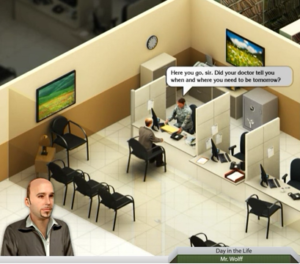Online Army Training Uses Simulation to Teach Courses
U.S. Army Medical Department
When it comes to Occupational Training there is nothing more powerful than a well-designed virtual simulation, which is why the United States Army Medical Department Center and School recently joined forces with MTS Technologies to create an engaging and effective virtual world for promoting the role of Patient Administrative Specialist, one of its key occupational specialties. The objective was to convert a four-week classroom-based course into a self-paced and easy to digest online option that would capture a typical day in the life of a Patient Administrative Specialist with two primary purposes in mind: Recruiting and Training.
In designing an immersive engaging and hands-on experience MTS has created a virtual environment that enables perspective specialists to actually spend time in the role becoming part of the experience by interacting with the screen rather than clicking through a series of slides. Equally important, it can be used for different target audiences in a variety of contexts.
Here’s a brief look at how this simulation works: “Well hello welcome to the Patient Administration Division or PAD, I am Sergeant Jensen, a Patient Administrative Specialist, I’m going to show you around so you can see what a typical day looks like around the PAD. I have a lot of work to do today so let’s get started.” “Hi, I just got married in PCSed here I need to register my wife Avery and have my medical records from my last station shipped here. Can you help me?” “Sure no problem, let’s take care of your wife first. Then I can take you to the Release of Information Office to request your records. Ma’am, May I please see your ID card I need to gather some information.”
Simulations such as a day-in-the-life have become increasingly popular for training both future and current workers in a number of academic disciplines and occupational categories. To begin with, these simulations pave the way for repetitive practice in an authentic and risk-free virtual environment, where trainees can apply new knowledge and make mission critical decisions while identifying obstacles, considering multiple perspectives, and rehearsing various responses. And by incorporating immediate feedback as well as engaging in enjoyable scenarios, simulations actually stimulate the brain in a way that increases motivation and engagement, which results in far better knowledge recall and retrieval over time. It’s no wonder then that the research continues to show how truly effective these experiential training tools are with learners often performing as well as seasoned professionals.
A simulation is the act of imitating the behavior of a situation, problem, or process in order to create realistic opportunities to practice skills and apply knowledge. Online simulations can increase access and reduce costs by not requiring physical space or equipment while promoting learning.
Online simulations can be done in a variety of formats. One way is with avatars as is the case with Drexel University’s College of Nursing and Health Professions where students can often interact with Tina Jones, a virtual avatar for standardized patient evaluations. In this simulation, Tina acts like a real patient by responding to how she is treated, approached, or the type of questions she is asked by the student practitioner. Drexel partnered with ShadowHealth to develop this simulation, which provide educators and students leading-edge education technology centered on conversation-based learning across a cast of virtual patients by trial and error in a safe environment.
Another format for online simulations can be done using live actors as is the case with Ryerson University, Centennial College and George Brown College. They partnered to create a Non-immersive Virtual Gaming Clinical Simulation (NVGCS) to replace the need for traditional live clinical simulations. For their purposes, the developers felt that virtual simulations using live actors instead of avatars made the experience more realistic.
Online Virtual World Simulation
The United States Army Medical Department Center and School (AMEDD C&S) needed an online course to train Patient Administrative Specialist (PAS), one of the military’s occupational specialties. In this case, they selected another form of simulation using a virtual world format.
AMEDD decided to create the virtual world simulation that allows students to become part of the experience by interacting with the screen and various scenarios. Their goal was to increase awareness and promote the importance of the role of a Patient Administrative Specialist (PAS) position in the army, one of the military’s occupational specialties.
The position of a PAS means one must be able to perform administrative procedures relating to admission and disposition of patients. AMEDD needed a course that provided two areas of focus including a new PAS recruitment tool and promoting the importance of the PAS role. The goal was to drive understanding of all of the duties required. AMEDD felt that creating a “Day in the Life” simulation was the best way to provide a highly engaging and simple demonstration.
How Does the Army Use Online Training?
Through AMEDD’s partner, MTS Technologies (MTS), a self-paced course was created in a virtual world so that learners could become part of the experience. They must interact with the screen rather than just clicking to the next screen. As they progress through the course, the selected scenario plays out.
Responses to the course indicate that it has been well received and hit the target. The Army has turned to MTS Technologies for work in other general courses as well including anatomy and physiology and extending beyond their medical division for courses such as utilizing augmented reality to train helicopter mechanics.
We can look forward to hearing more about AMEDD and MTS Technologies as they are currently embarking upon diving into the latest disruptive technologies to create innovative experiential learning.




